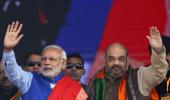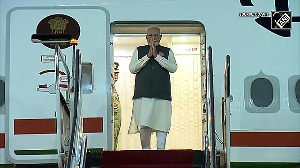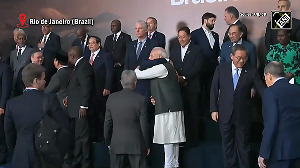'The innate fascism of the RSS is overshadowing Modi's development programme,' argues Amulya Ganguli.

Just as the Communists believed in 1947-1948 that India had not attained 'real' Independence -- yeh azadi jhooti hai -- the RSS today believes that the Jana Gana Mana is not the real national anthem. In its view, that honour should go to Vande Mataram.
The first signs that the Sangh Parivar wanted a second look at the Jana Gana Mana was when Rajasthan Governor Kalyan Singh -- who presided over the Babri Masjid demolition in 1992 as the Uttar Pradesh chief minister -- proposed his own version of Rabindranath Tagore's song in which the word 'adhinayaka' was sought to be replaced by 'mangal gaye' since the existing word, according to him, referred to King George V.
The same point was made more recently by the Parivar's in-house gadfly, Subramanian Swamy.
Although the composition of the song coincided with the Coronation Durbar in New Delhi in 1911, Tagore later said that the 'great charioteer of human destiny' -- hay chira sarathi -- 'cannot, by any means, be fifth or sixth, or any George.'
If dislike for the 'Angrezi shashak' (English ruler), to quote Kalyan Singh, is the reason for the objections of the RSS and the BJP to the national anthem, Vande Mataram cannot pass muster either because it occurs in Bankim Chandra Chattopadhyay's Anand Math in the context of welcoming the English since they were expected to put an end to Muslim rule.
The RSS may be pleased with this particular fallout of the advent of the English, but it cannot ignore the background of the paean to Mother India.
It is another matter that the exultation over the termination of what came to be known in history books as the Muslim period was subsequently forgotten (or overlooked) and the exhilarating lyrics and tune of Vande Mataram came to symbolise nationalism per se for the freedom fighters.
But the past cannot be conveniently brushed aside to suit a present purpose.
Another aspect of 'Angrezi shashan' which the saffron brotherhood finds unacceptable is the Constitution, which, as is known, is modelled on the Government of India Act of 1935. Therefore, the saffronites want to get rid of this Macaulayan legacy and replace it by something indigenous.
Not surprisingly, one of the first acts of the Atal Bihari Vajpayee government was to set up a commission to rewrite the Constitution.
It is possible that Vajpayee took the step unwillingly, only to get the Hindutva hawks off his back, and only after the government assured the commission's chairman, Justice M N Venkatachaliah, that no changes in the basic structure of the Constitution was contemplated.
Since, in the end, the Constitution was left untouched, the unsuccessful attempt to tinker with it by the saffron camp can be said to be of little importance.
But the significance of its intervention lies in revealing the mindset of those who are dissatisfied with the present scheme of thing and want a drastic change.
This radical impulse can be gauged from the suggestions which were submitted by the RSS to the commission. Their central point was the setting up of a Guru Sabha for 'Bharat.' All the three 'estates' of modern governance -- the legislature, the executive and the judiciary -- were expected to function under the Guru Sabha, which would have overriding powers.
In effect, it would be like the Iranian Guardians Council, comprising theologians appointed by the country's supreme leader, who is a cleric, and six others nominated by the judiciary. According to the RSS 'theologians', the Guru Sabha will not be a body elected on the basis of universal adult franchise, but by a restricted electorate comprising teachers of schools, colleges and universities.
When the proposal was made, the Jawaharlal Nehru University and the Hyderabad Central University had not hit the headlines as they have done now. It is unlikely, therefore, that the RSS will stand by its earlier proposal at present.
But the object of this exercise of dismantling the Constitution is obvious -- the RSS wants the transfer of power away from voters to a group of 'teachers' -- of shakhas, vidya bhavans, sishu mandirs, et al -- which the Nagpur patriarchs think they will be able to control.
Apart from a tendency to create a problem where none exists, there is an element of elitism in the suggestion to negate the concept of universal franchise. Yet, it is this system of allowing everyone to vote which saved India from the Emergency in 1977 when the would-be dictators were thrown out.
If a restricted electorate comprising, say, the educated middle class had been the masters of the country's destiny, the self-serving rulers would have remained in place because the trains ran on time, the standard justification for authoritarianism.
Having interpreted the BJP's assumption of power at the Centre as a licence to implement a pro-Hindu agenda, the RSS is pushing ahead with great enthusiasm with a spokesman even equating its trademark saffron flag -- bhagwa dhwaj -- with the Tricolour.
Taken together with attempts to force everyone to say Bharat Mata Ki Jai -- a Gujarat college has told applicants that they will not be admitted unless they write the slogan on their forms -- the innate fascism of the RSS is overshadowing Modi's development programme.
Amulya Ganguli is a writer on current affairs.
IMAGE: Members of the RSS take part in a Dussehra celebration in Ahmedabad. Photograph: Amit Dave/Reuters










